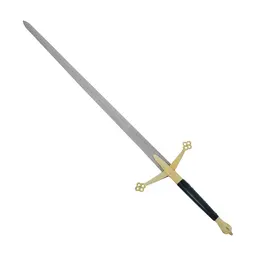Product description
The claymore (from Gaelic claideamh-mor, great sword) was a Celtic two-handed sword that was usually 150 cm or longer. This length made it very difficult for opponents to approach. The claymore often had a long, leather-covered ricasso, so that the warrior could place both hands on the blade when his enemy came close. The earliest claymores were used in the 16th century, the latest in the 18th century. This claymore has a brass pommel and crossguard. It has a wooden grip that is wrapped in leather.
Details:
Material: En45 carbon steel
Weight: 2.4kg
Edge: Semi-sharp
Length: 142 cm
Blade length 109 cm
Delivered without scabbard
Grip length 19 cm
Max. blade width: 4,6 cm
Based on a historical original
Shipment weight (g): 2000 *
We do not sell this product to customers under the age of 18. Click here for more information on the European arms acts.
This item is produced in limited quantities only. This means that every piece is unique. Sizes & finish may vary lightly from piece to piece.
Prevent rust and corrosion by oiling your weapons regularly. Remove rust easily with black sandpaper. Remove burrs with a whetstone. Make sure you have removed all burrs before using a battle-ready weapon, as they can cause wounds.
Tip: How to adjust the finish of your armour and weaponry
Luxurious (polished)- polish the steel with metal polish or toothpaste. You can even give the item a mirror-like polish. Test on a small surface first!
Handmade (matte)- soak the steel in cola for 40 minutes to 20 hours. Check regularly and treat with black sandpaper.
Antique (patinated) leave the steel to rust for some time in a damp environment, preferably outside. Remove the red layer of rust, to reveal the corroded top layer.
Please note. After finishing the product yourself, the warranty and return right expire. Celtic WebMerchant is not responsible for the obtained result."
When packaging this item, we exclusively use 100% recycled plastic and recycled paper/cardboard from FSC certified forests. We reuse a large part of the material directly without the intervention of a recycling process.
Recycle the material by separating your waste:
1. Cardboard: separate or reuse your paper.
2. Plastic cushions, clothing bags and plastic tape: separate or reuse your plastic. If possible, pierce the cushions with a volume reduction needle.
3. Paper packaging for jewelry and small items: these have a plastic inner layer. Remove these, then separate your paper and plastic.
Read here about how we are committed to sustainability.

